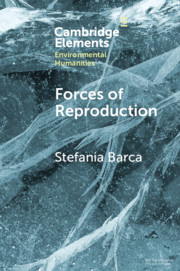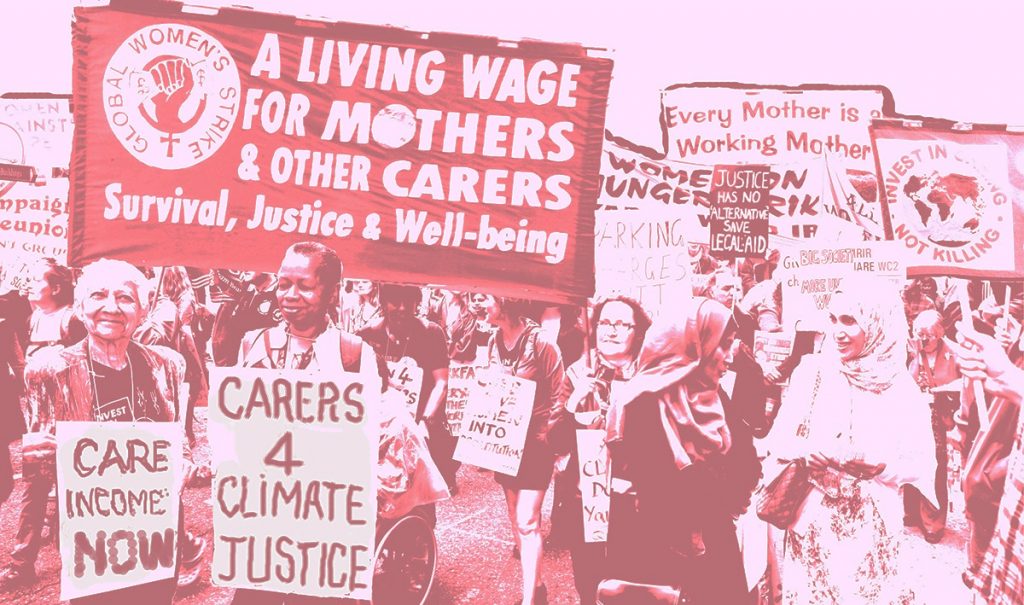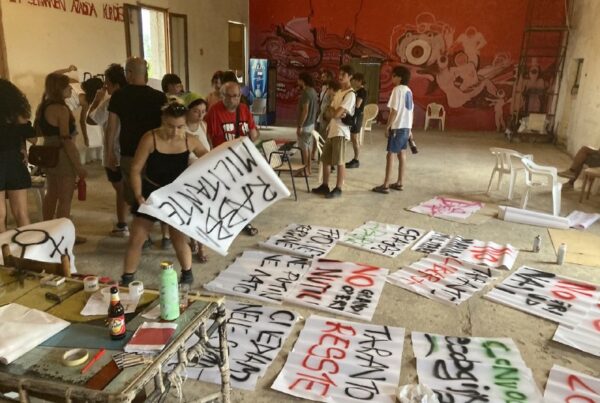By Ethemcan Turhan
Against the grim background of increasing global warming and related disasters, global climate justice movements call for radical political and economic transformations. Accordingly, positioning social reproduction in all its diverse forms at the center of the struggle for life is among the most important steps of these transformations. Building on her latest book, Forces of Reproduction: Notes For A Counter-Hegemonic Anthropocene (Cambridge University Press, 2020), we spoke with environmental historian and political ecologist Stefania Barca on the labour of earthcare, commoning and environmental justice from a materialist ecofeminist perspective
Ethemcan Turhan: Let’s start with your emphasis on the forces of reproduction, as non-binary, more-than-human and other-than-master subjects whose work sustains the master. You convincingly argue that the Anthropocene storyline obliterates the agency of the forces of reproduction. How does it do that? And can we possibly speak of ‘good Anthropocenes’ as some scholars argue or does the concept call for a categorical rejection as Anthropo-obscene?
Stefania Barca: As many critical social and human scholars have pointed out, the Anthropocene is a faulty concept because of its obliteration of differences. Differences are intended as unequal responsibilities in causing the planetary crisis – which cannot be shouldered upon the world’s poorest, the majority world, mostly coinciding with the colonized; they are also understood as unequal impacts of earth-system changes upon the poorest.. This unbearable paradox of reverse relationship between cause and effect is what elicits rejection for the universalizing concept of Anthropos, which appears to both reflect and naturalize privilege. If the Anthropos is understood as a universalization of the western consumerist lifestyle, this is obviously a distorted and unjust representation of humanity. The fact that, the Anthropocene concept is such a normalized metaphor, speaks volumes to the lingering coloniality of (meta)scientific, governmental and mediatized discourses on climate change.
In the first part of the book, I criticize the Welcome to the Anthropocene narrative launched at the second UN Earth Summit in Rio de Janeiro. I show how the video’s storyline celebrates so-called productive forces (western science and industrial technology, including fossil fuels, and global trade) as drivers of human ‘health, wealth, security and longevity’, while ignoring the agency of reproductive forces: not only women’s bodies and historically feminized and racialized care workers, but all struggles for reproduction more broadly, enacted by environmental justice, peasant and other movements in their strive for protecting life and the commons from value extraction and depletion. Equally importantly, this ‘ignorance’ of reproductive struggles includes the historical agency of waged workers’ mobilizations for health and safety and for the regulation of hazards and toxicity in industrial production.
My argument is that, by subordinating human ‘health, wealth, security and longevity’ to capitalist/industrial forces, the narrative delivers two powerful subliminal messages: first, it makes the forces of reproduction seem irrelevant to human wellbeing; second, it suggests that capitalist/industrial modernity needs to be saved, for there is no alternative for humanity to prosper. Echoing Mark Fisher, I call this discursive dispositif “eco-capitalist realism”: a new version of the TINA (There Is No Alternative) discourse, suggesting that the planetary ecological crisis can only be ‘solved’ by the same forces which have caused it. No change of system is needed – or indeed desirable.
Regarding the second part of your question, on the possibility for a ‘good Anthropocene’: the answer depends on both what is meant by ‘good’ and on who we imagine the Anthropos to be. In the hegemonic narrative, ‘good’ means an improved, greener version of the master system, one capable of reproducing itself within planetary boundaries, without addressing its inherent contradictions. This is the eco-capitalist model mentioned above. However, some of the most advanced formulations of this idea, e.g. Kate Raworth’s Doughnut Economy model, or the Just Transition strategy promoted by union confederations (ITUC), or the various Green New Deal plans, highlight how climate policies must put boundaries simultaneously in both the environmental and in the social sphere, by combating further impoverishment and inequalities. A ‘good Anthropocene’, from these ‘progressive’ perspectives, is one which manages to put and enforce socio-ecological limits to capitalist/industrial modernity, by way of democratizing climate politics. In other words, many understand the Anthropocene concept as ambivalent: it can mean total destruction or salvation depending on what potentialities of the human are activated and in what relations of force.
I am sympathetic with this approach – insofar as it leads to various forms of ‘radical realism’. However, the question is: do we actually need to mobilize the Anthropocene concept? is it a useful tool or an obstacle to system change? It seems to me that the second has been the case, because the Anthropocene has represented humanity as coinciding with the master, rendering counter-master agencies invisible or irrelevant (when not illegal, clandestine, or inimical to the ‘good Anthropocene’). This has concrete consequences: for example, earth defenders are persecuted and killed with impunity, while polluters are tolerated, when not rewarded, as necessary allies of the post-carbon transition. Also, care labour and commoning remain unrecognized and overburdened. For example, the ITUC Just Transition strategy is entirely geared around waged industrial jobs, while ‘forgetting’ the relevance of unwaged care labour in keeping the world alive and healthy. In other words, in the ‘good Anthropocene’, the forces of reproduction might still be unrecognized and overburdened, precisely because care and commoning are not included in the hegemonic idea of the Anthropos.

ET: One of the key concepts that run throughout the book is earthcare labor. As green Keynesian proposals are having a field day with Biden presidency, what needs to be the defining characteristics of earthcare labor that goes beyond nature/culture, male/female, productive/reproductive dualisms and technofixes? Thus, linked to this point, what are some of the “truly earthcaring possibilities that can be opened up by liberating forces of re/production”?
SB: By “earthcare labour” I mean a specific type of care labour – that of tending to nonhuman nature, for example the soil, water, nonhuman animals, plants, etc. that are part of the web of interdependencies which keep people alive. This kind of labour is practiced in both rural and urban contests: for example, in subsistence farming, fishing, agroforestry, seed saving, water conservation, wild fruits, nuts and mushrooms gathering; but also in urban gardening, in the creation and tending of urban green, as well as the protection of urban areas from toxicity and waste. Earthcare labour is expended in what Indigenous and community feminists in Latin America call the land/body/territory (territorio/cuerpo/tierra). Like domestic labour counters the depleting effects of capitalist industrial modernity upon human bodies, nurturing and replenishing them, so earthcare labour actively counters the ‘metabolic rift’ by protecting and regenerating nonhuman nature and habitats. In fact, Australian ecofeminist Ariel Salleh has suggested that this labour produces ‘metabolic value’.
Earthcare fundamentally challenges the separation between production and reproduction – which incorporates and reflects the male/female, culture/nature and civilized/savage dualisms. Ecofeminists conceptualize domestic and earthcare labour as “the production of life”. Paying attention towards its historical agency and subjectivity allows us to realize its autonomy from capital. This is what I mean by the expression “forces of reproduction” – which I take from the British ecosocialist feminist Mary Mellor. Capitalism has a dual, contradictory relation to earthcare, similar to its relation to domestic labour. On the one hand, it sees it as something to free-ride upon (to use an expression by Nancy Fraser), an infinitely available gift, a ‘natural’ activity – not as a form of production proper, but as a pre-condition for it. Being denied its ‘productive’ nature, earthcare labour is socially devalued and backgrounded. Capitalism could not develop without either domestic or earthcare labour – but it does not pay for their ‘services’. This creates a specific form of capitalist theft, which Salleh has called ‘embodied debt’. On the other hand, capital is threatened by this labour because of its capacity for producing wealth outside of capitalist relations. In this perspective, earthcare labour is not simply what capital free-rides upon, but constitutes a real alternative to it – the possibility of developing human potential in non-extractive relations with the biosphere. In other words, earthcare labour participates in the capital/labour conflict with its own agency: it resists, and tends to transcend, capitalist/industrial modernity by producing non-extractive and commoning relations. This is why capital both strongly opposes earthcare, and tends to subsume it into wage or financial relations, e.g. via PES (“payment for ecosystem services”) and similar schemes.
Liberating the potential of earthcare labour means struggling for its autonomous development beyond capitalist relations of reproduction. One key example that has inspired my book is that of the Brazilian protected areas called ‘extractive reserves’ – where the term extractive refers to the collection of the rich variety of non-timber-forest-products offered by nature on the part of communities of forest guardians called ‘extractivistas’. These communities make a living and develop their potential through earthcare labour, i.e. their subsistence relation to forests or other biomes on whose reproduction they depend. What I find truly revolutionary about this model of conservation is that it challenges hegemonic assumptions about the unproductivity of care and commoning labour: if productivity is measured in terms of biodiversity rather than cash, the extractive reserves have a productive capacity between 100 and 200 times higher than monocrop plantations. High biodiversity, in turn, allows for a variety of products to be extracted from the same area, sustaining human communities to thrive in their territory, and to resist dispossession and proletarianization.
ET: You sketch 4-levels of denial and backgrounding that is necessary to overcome if we are to undo the Anthropocene: colonial, gender, class and (inter)-species relations. You also underline that a counter-model is yet to be found in state formations. If this is the case, which institutions should progressive politics need to start attacking to undo this denialism? The state, as Andreas Malm also suggests in his case for war communism, or other societal configurations in, against and beyond the state for ecosocialism?
SB: Answering your question implies to first clarify what we mean by progressive politics and in what context: progress with respect to what? Keeping the focus on the climate and environmental crisis, I understand progressive politics as that which aims to transcend eco-capitalist realism, and more broadly the ecological modernization paradigm adopted by both capitalist and state-socialist regimes over the past few decades. This progressive politics already exists, and is struggling against the hegemony of the master model: over the past three decades, it has come together in meetings and events that have paralleled and It is a convergence of various movements that struggle against racial/colonial, sex/gender, class, and species inequalities, because they have experienced first-hand how each of these are intimately connected to the environmental crisis. They recognize themselves as the global environmental (or climate) justice movement.
Environmental justice is a BIPOC (Black, Indigenous, and People of Color) movement born in the US over three decades ago, from the awareness that the environmental crisis in that country was a racial issue: dumping toxic and nuclear waste upon racialized communities was (and still is) essential to the profitability of the capitalist/industrial mode of production. But the movement soon realized that the same also applies on a global scale, in terms of environmental colonialism. Indigenous movements claim that their people have been struggling against the extinction caused by white-settler colonization for more than five hundred years, and strive for the recognition of their right to self-determination, also connecting it to the protection of biodiversity and life on earth. At the same time, women’s movements have realized how ecological degradation and extinction are deeply imbricated with patriarchy, and found themselves on the frontline of struggles against the interconnected violence of capitalist/industrial modernity upon land, bodies and territories. Queer activists have been making the connection between human supremacy and heteronormativity, and engaging in struggles for the liberation of nonhuman animals and for more-than-human kinship. Peasant movements have connected land grabbing and industrial monocultures to rising global CO2 emissions and biodiversity loss, and are claiming their right to land and food sovereignty as a way to ‘cool down the earth’. The convergence among all these movements became a concrete political possibility during Rio+20 in 2012: while UN delegates agreed on the eco-capitalist ‘green growth’ strategy as expressed by the official document The future we want, climate justice movements met at a people’s climate summit (cupola dos povos) and produced a final document called Another Future Is Possible.
Coming back to your question: what is most interesting to me is how all these movements, in one way or another, have been accused of being backward looking, for their refusal to comply with the singular hegemonic model of capitalist/industrial modernity, and their insistence that other modernities are possible. In rejecting the violent singularity of modernity, climate justice movements are rejecting all four dualisms of western culture, which converge towards the productive/reproductive dualism highlighted above. While capitalism has taught us to identify the first with money-making and the second with life-making – a necessary but nevertheless subordinated, dependent and qualitatively inferior activity – climate justice movements are claiming the progressive, i.e. egalitarian, emancipatory, and wealth-producing agency of reproductive forces. This is the thesis I defend in the book.
Labelling climate justice as regressive politics is one of the ways in which the master model of humanity defends its global hegemony. What becomes crucial in this struggle, then, is the position taken by labour organizations. Working-class communities in industrialized nations have experienced early on the hazards of capitalist industrial modernity, and their organizations have been on the frontline in defending the health and safety of both workers and the public against industrial toxicity. This historical environmental agency of labour organizations must be because it speaks to the alternative possibilities that are inscribed within industrial modernity – to the importance of social conflict as a means to social progress. However, most trade-union organizations have officially endorsed the “green growth” strategy, seeing in it a more progressive politics than business as usual or right-wing climate denialism – in other words, they are trapped in eco-capitalist realism. I have called this the eco-modernist dilemma of labour, a dilemma that involves the entire institutional Left in industrial democracies. My argument is that such dilemma derives from accepting the hierarchical production/reproduction binary and considering sex/gender, species or racial/colonial conflicts as secondary to, rather than intersecting with class conflict. Trapped in this reductive vision of class politics, labour movements tend to identify with blue-collar industrial jobs, and this limits the possibilities for developing labour’s truly transformative, anti-master potential. It is high time for labour organizations to both recognize the equal dignity and ecological relevance of care labour, and to demand a thorough politico-economic restructuring that reflects this vision. In other words, it is time for labour movements to let go of eco-capitalist realism and join the counter-hegemonic struggles based on a feminist and decolonial eco-socialist program.
ET: Building on the work of prominent Marxist and ecofeminist scholars such as Mellor, Mies, Merchant, Salleh and others, you argue that capitalist modernity subordinated reproduction (or life making) to production (or industrial growth) by conceptualizing labor in opposition to both nature and women. You also mention that “a truly ecological socialism must reverse this order by subordinating production to reproduction and ecology”. For instance, can universal basic income (UBI) help achieve this? Or how should we think about some Marxist critiques of UBI as taming contradictions of the capital instead of demanding shorter working hours and living wages?
SB: UBI is a compromise between different political perspectives – including the Autonomist Marxist perspective (as in, for example, the US feminist scholar Kathi Weeks), which articulates UBI with other demands, like shorter working hours. I believe that, like other ‘progressive’ political proposals, UBI can lead to different results depending on how it is mobilized. In times of dramatic rise in poverty and economic insecurity – due to the Covid pandemic – the demand for a basic income should not be easily dismissed, as it might be catering to the survival needs of millions. None of the proposed alternatives is perfect. Shorter working hours and living wages are necessary, but also complementary demands – they would not address the needs of informal or wage-less workers. In fact, lest we forget, the majority of the world poor – the global proletariat – are women and girls of colour, whose long working days are largely unpaid. Obviously, their work is taken for granted, and discounted as ‘reproductive’ and a ‘natural activity’ – a mixture of love and subsistence. A UBI might cater to their needs by freeing them from extreme levels of poverty and easing their burden in providing for children and other dependent family members. In this sense, it would be a very welcome improvement in their lives.
A somewhat similar proposal, which I have actively endorsed and contributed to formulating, is that of a Care Income. Unlike UBI, which is unconditional transfer, CI expressly aims at compensating those who perform unwaged care work – recognizing the right of all carers to being cared and provided for by society. This proposal emerged in 2019, as part of a collaboration among climate justice, degrowth and feminist activists and scholars working together on a document called A Blueprint for Europe’s Just Transition, which included the Care Income within its plan for Green Public Works, i.e. publicly funded jobs in environmental restoration and social reproduction. The Care Income proposal demands a guaranteed and publicly funded income for unwaged carers in recognition of their key contribution to social and ecological wellbeing. In this way, unwaged ‘reproductive’ work done in homes, communities and/or the environment (e.g. urban farming) starts to be equalled (at least nominally) to waged ‘productive’ work done in energy, transport, manufacturing etc. The Care Income is a recognition of how much society owes unpaid caregivers for what they do to keep people and places alive and healthy. Of course, part of social reproduction already is publicly funded – e.g. in public schools, hospitals etc. Our proposal was to extend this funding to the invisible but huge amount of unpaid care work that also forms the base of the economy iceberg. If publicly guaranteed, and measured (concretely) against individual carers’ needs – rather than (abstractly) against their time engagement – this compensation does not equal commodification. About possible ways of funding this, see the aforementioned report.
The pandemic made the Care Income demand all the more urgent, and this originated a dedicated international campaign, jointly promoted by the Global Women Strike (GWS) and Women of Colour GWS movements. This campaign has been led and inspired by one of the leading figures of “radical care” activism worldwide, historically and at present, the US activist and writer Selma James, who is especially known for being an initiator of the Wages for Housework (WfH) campaign in the early 1970s. Despite reflecting substantially different ways of valuing care work, both campaigns hold a radically transformative potential: that of elevating the social perception of carers as workers – standing on equal foot with other categories of workers. In the WfH campaign, this was intended to allow women to liberate themselves from oppressive and diminishing representations (as unproductive and economically dependent subjects), gain a clear understanding of the value of their contribution to society, and organize collectively for their rights, and for the rights of all carers and of care-receiving people as well. The Care Income campaign merges this vision with that of climate justice and degrowth movements, elevating the social perception of carers of all genders as those who contribute most directly to social and ecological wellbeing, and thus as (potential) key subjects in the Just Transition.

Source: Global Women Strike
ET: One of the key debates you take in the book is commons and commoning. Quoting Winona LaDuke, you recall how corporations have been granted the “right to private injury and personal damage when pursuing progressive improvements”. This is something we see often in Turkey with the use of “higher public good” argument by the crony state capitalism to legimitize mining/energy concessions. Most recently, a Canadian goldminer company took the government to arbitration court demanding 1 billion USD for their losses for a project that raised significant social reaction. What are the potentials and possibilities of global environmental justice movements today for re-commoning?
SB: Everywhere in the world today, except a few ‘freed zones’ like Chiapas or Rojava, the relations of power are overwhelmingly in favour of the master system. Reversing them requires a struggle on simultaneous fronts. For example, the legal front – the battle for international ecocide law, initiated years ago by the late (and very much missed) international lawyer Polly Higgins. Unfortunately, there is no such thing as a ‘head’ to strike against in one coup. All of us can and must play a part in weakening and cracking the formidable power we face, the Goliath of the neoliberal world system. Capitalist/industrial modernity is an extremely pervasive reality, made stronger by the mutually reinforcing inequalities highlighted above, and constantly engaged in devouring all that exists as other-than-itself. The commons – or better, the political principle and praxis of commoning – is its main enemy, precisely because it challenges the hyper-separations and dualisms that allow for inequality and accumulation. Commoning is a mortal sin for the master system.
The example of ‘extractive reserves’ is a case in point: Maria and Zé Claudio (the two forest defenders whose story inspired my book), like many other earth defenders, were killed because of their opposition to the logic of commodification, of turning forests into abstract social value. Their vision can be understood as more-than-human commoning: their relationship with the forest was both one of social reciprocity, in terms of equal access and responsibilities on the part of all members of the community, and of inter-species being, i.e. of commonality between themselves and the plants and other elements of the castanhal forest, with which they felt as one. Theirs was not an isolated case of heroism, but the experience of millions of people worldwide, chiefly peasant and Indigenous communities, who maintain a direct subsistence relationship with the land. As the Brazilian rubber-tapper unionist Chico Mendes understood, their struggle is not simply one for livelihood and sovereignty, nor even just one for defending ‘nature’, but “a struggle for humanity” – in the sense of a different possibility for human habitation of the earth. This is also the struggle of the climate justice movement, and our only possibility at surviving capitalist/industrial modernity.
However, the commoning praxis is also an urban movement which has been countering the depleting effects of capitalist/industrial modernity. Since the global financial crisis of 2008, especially, the interlocked nature of multiple crises has become evident, and has spurred a new wave of mobilization around social reproduction – that is, what people essentially need to reproduce themselves. This includes access to both material and immaterial goods like food, water and other basic infrastructures, housing, healthcare, schooling, and a healthy environment. In southern Europe – one of the places most hardly hit by the financial crisis in the global north – activists have mobilized to not only defend but also regenerate the commons and make them accessible to all, countering long-term processes of ‘commodification of everything’. Social struggles have been accompanied by daily work done by activists in their communities to rebuild, enlarge and consolidate the commons. I understand this work as ‘community care’, i.e. a type of ‘radical care’ that aims at producing new, anti-extractive, commoning relations among people and between them and their environments, and also between metropolitan areas and their hinterlands. The pandemic has greatly expanded this work, putting a heavier burden upon the shoulders of activists engaged with sustaining the social reproduction and survival of their communities through mutual aid and solidarity work.
Community care takes place in physical spaces that function as the care infrastructures for community self-help: these are often the decaying and dismissed buildings, sometimes old factories, or even abandoned open spaces such as parks and farmland, that form the ruins of the neoliberal restructuring of both cities and rural areas. Commoning activists occupy and reclaim them with their work: cleaning-up, restoring, repairing, adapting and turning ruins into inhabitable spaces for humans to find refuge and replenishment – common homes. I see this as community housework – as taking care of a common house. Like domestic care, so community care is not a set of unproductive and unskilled practices, but emerges from a skilful and careful combination of diverse people’s contributions, through the painstaking work of weaving together needs, abilities, and visions. Moreover, community care holds a very important potential for creating wealth, in the sense of non-extractive and non-exploitative ways of generating income that may become truly vital for people to survive prolonged crises, and even to rebuild their existence and realize their dreams. Recycle and repair shops, re-fabrication workshops, growing, processing and cooking food, flea markets, brewing, artisanal productions, theatre, music and arts, sports, dance and fitness, are all income-generating activities that people have been able to perform in community spaces thanks to the work of taking care of common infrastructures. In other words, community care is related to community economy. I think these different forms of commoning are our best hope for resisting the multiple crises of our time, and developing the capacity for alternative forms of modernity.
Acknowledgments
My reflections on “radical realism” have been deeply inspired by a number of counter-hegemonic real-life experiences and by the people who brought them to my attention: to name just the ones I have had the privilege of getting to know better, I wish to thank Felipe Milanez, Claudelice Santos, and the Reserva Agroextrativista Praialta Piranheira in Nova Ipixuna (BR); and Roberto Sciarelli and the community-carers of the Scugnizzo Liberato in Naples (IT). I am also grateful to the Zennström CCL programme of Uppsala University for giving me the time, space and resources to further explore climate justice, and to the programme’s coordinators Laila Mendy and Isabel Baudish for their invaluable help in investigating the climate/care nexus.
Stefania Barca is Distinguished Researcher “Beatriz Galindo” senior at the University of Santiago de Compostela (Spain); she also holds the position of Senior Researcher at the Center for Social Studies, University of Coimbra (Portugal). Previous to this, she was Zennström professor in Climate Change Leadership at Uppsala University. As an environmental historian and political ecologist, she investigates the labour/ecology/gender nexus in the industrial era. Her scholarly works appeared in highly acclaimed academic journals such as Geoforum, Capitalism Nature Socialism, Environmental History, Ecological Economics, Environment and History, Sustainability: Science, Practice and Policy and Globalizations among others, and have been also disseminated in extra-academic publications in several languages. She is active in international ecosocialist and degrowth networks.
Ethemcan Turhan is an assistant professor at the Faculty of Spatial Sciences, University of Groningen (Netherlands). He was previously a postdoctoral researcher at KTH (Royal Institute of Technology) Environmental Humanities Laboratory between 2016 and 2020. His academic works appeared in journals such Energy Research and Social Science, Sustainability Science, WIREs Climate Change, Global Environmental Change, Journal of Political Ecology, Dialogues in Human Geography and Capitalism Nature Socialism among others. Most recently, he co-edited the special issue Urban Climate Insurgency for Social Text (forthcoming in March 2022).
This interview first appeared in Turkish in volume 57 of Praksis, a quarterly journal of social sciences embracing the historical materialist tradition as a whole.







One Comment